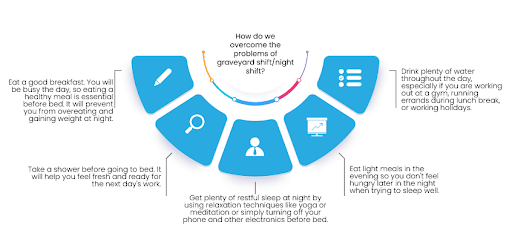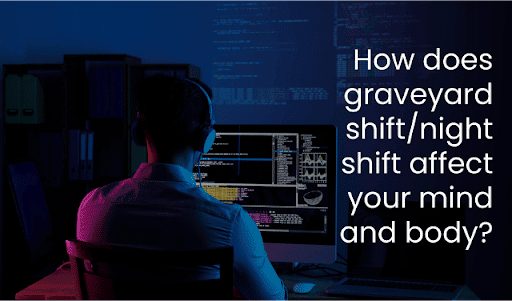Introduction
The graveyard shift, or graveyard shift work, refers to when employees must be on duty and at their place of employment. It is typically after the end of business hours and before the beginning of business hours.
This article aims to help you understand the problems associated with the night shift and provide you with some tips on how to overcome the difficulties of the graveyard shift/night shift.
What is a graveyard shift/night shift?
A graveyard shift is when you start at the end of the day and continue working through the night until the early morning hours. For example, working from 8 PM to 4 AM would be a graveyard shift.
A night shift is a shift that begins at the end of the day and continues until midnight or later.
For example, you would be on a night shift if you work from 8 PM to 6 AM.
Night shifts are standard in manufacturing, hospitality, transportation and healthcare industries. In many cases, these workers must work at least one 24-hour day per week to meet production deadlines or stay on schedule for deliveries.
Furthermore, graveyard shifts/night shifts are generally longer than day shifts because these are late evening hours when people are most likely to be awake.
These shifts also tend to be more physically demanding than daytime ones due to the extra hours of darkness, which can lead to problems such as high blood pressure, muscle fatigue, dehydration and sleep deprivation.
Read more about: How To Get A Good Night’s Sleep: Uncover The Key To A Restful Night
What are the problems of the graveyard shift/night shift?
The issues of the graveyard shift/night shift can be many, but for starters, there’s the lack of sleep. Sleep is essential for your body and mind to rest, recover, and prepare for another day. A lack of sleep can cause you to have a less-than-optimal performance at work, which could lead to an accident on the job.
There are many other setbacks of night shifts, some of which are as follows:
- Your body clock alters, and you may be tired during the day.
- You get less exposure to daylight, which is essential for health reasons.
- It is harder to fit in with your colleagues at work because they are awake simultaneously as you are asleep.
- Your sleep patterns become irregular, and you may wake up more often at night.
- You may feel more depressed or irritable because you’re not getting enough sleep.
- Constant night shifts can lead to poor concentration and memory skills.
In addition, people who work long hours are more likely to suffer from depression and anxiety, which can lead to other health problems and affect their quality of life.
How does the graveyard shift/night shift affect your mind and body?
The effects of night shift work on the human body are numerous and far-reaching. They include sleep deprivation, obesity, diabetes, heart disease, and mental health problems such as depression and anxiety.
Shift workers often suffer from poor nutrition because their eating hours affect their eating patterns, and they may consume more alcohol than usual or binge on junk food when off duty. Night shift workers are also at a higher risk of not getting enough exercise because they cannot make time for training during the day when they are working and sleeping through their usual bedtime.
Furthermore, night shift workers have an increased risk for low-grade inflammation (a marker of chronic stress) compared with those who work a day shift. It might be due to exposure to light at night that affects the pineal gland in the brain, which regulates melatonin production and sleepiness.
Night shift work can seriously affect your health and personal life if you don’t take care of yourself while on shift.
Read more about: Understanding Insomnia Guide
How do we overcome the problems of the graveyard shift/night shift?
The problem with the graveyard shift is that it’s harder to maintain a healthy lifestyle. Sleeping well is complex, and it can be even more complicated if you are a morning person.

Here are some tips to help you overcome the problems of the graveyard shift/night shift:
- Eat a good breakfast. You will be busy the day, so eating a healthy meal is essential before bed, preventing you from overeating and gaining weight at night.
- Take a shower before going to bed. It will help you feel fresh and ready for the next day’s work.
- Get plenty of restful sleep at night by using relaxation techniques like yoga or meditation or simply turning off your phone and other electronics before bed.
- Eat light meals in the evening, so you don’t feel hungry later in the night when trying to sleep well.
- Drink plenty of water throughout the day, especially if you are working out at a gym, running errands during lunch break, or working holidays.
- Physical exercise, stress-buster hobbies, spending at least one hour with family and not isolating oneself are essential.
- Choosing a shift that suits your personality, such as some people work better at night.
Conclusion
It’s hard to get enough sleep while working a night shift. The hours are long, the work is hard, and the commute is long. But it’s not just the physical exhaustion that can leave you feeling drained by the end of the shift.
Working at night can increase stress levels, leading to weight gain and an increased risk of Type 2 diabetes. Sleep deprivation may also increase the risk of heart disease, depression, and other serious health problems.
Furthermore, your mind also suffers if you don’t get enough sleep — not because it’s terrible for you, but because lack of sleep can affect your ability to think clearly or make decisions during your shift. It can also make you more prone to making mistakes at work or having accidents on the job.
To sum up, the impact of night shift work on the body and mind is genuine. Hence, it’s essential to understand how night shifts affect your health and well-being to make informed decisions about working long hours.
| [1] | E. S. Schernhammer et al., “Rotating night shifts and risk of breast cancer in women participating in the nurses’ health study,” J. Natl. Cancer Inst., vol. 93, no. 20, pp. 1563–1568, 2001. |
| [2] | V. Kretschmer, K.-H. Schmidt, and B. Griefahn, “Bright light effects on working memory, sustained attention and concentration of elderly night shift workers,” Light. Res. Technol., vol. 44, no. 3, pp. 316–333, 2012. |





